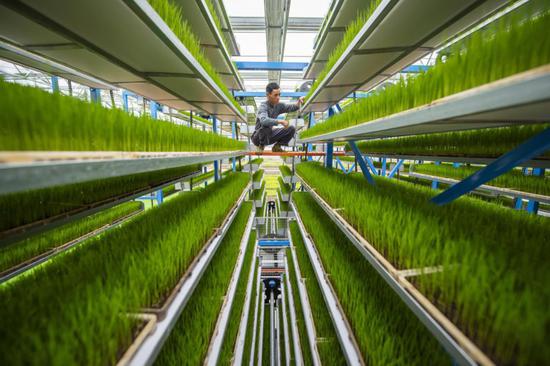
An employee checks rice growing status at an intelligent greenhouse in Wuhu, Anhui province, on May 2. (Photo/China Daily)
At a vegetable cultivation facility in Deqing county, Zhejiang province, clusters of tomatoes hang from branches like red and green Christmas ornaments, while workers shuttle back and forth, busily harvesting, sorting and packaging the fresh produce for distribution nationwide.
Spanning nearly 40 mu (2.67 hectares), Shuimu Vegetable Factory is the first agricultural complex in the country to possess national independent intellectual property rights. In contrast to traditional agricultural bases, the digital vegetable factory requires only 10 staffers.
The facility said its advanced agricultural facilities and equipment have employed techniques such as soilless cultivation and water-saving irrigation, along with an intelligent automated control system, thus breaking the seasonal constraints of traditional planting and enabling uninterrupted year-round production.
For instance, tomato cultivation at the factory has achieved full-life-cycle digital management, ensuring not only controlled product quality, but also reduced waste. With an annual output of 1.25 million kilograms of tomatoes, it can meet annual consumption demand of nearly 50,000 people, it said.
"At present, during the critical period of vegetable sales, we are employing soilless cultivation and full-scale digital management. Stable electricity supply enables us to achieve uninterrupted planting and cultivation," said Alfa, the factory's director.
The local power supplier has helped inspect distribution transformers and lines in the factory, conducted in-depth inspections of smart greenhouses, and checked facilities such as self-service fertilization machines and heat pump systems to ensure seamless electricity usage, he said.
"Following their suggestions, we replaced the old natural gas boiler heating equipment with geothermal or photovoltaic equipment to reduce energy costs. Now, energy consumption of heating equipment has been reduced by about 50 percent, saving a considerable amount of power costs," said the factory director.
To serve the digital transformation of the local agricultural industry and boost rural vitalization, Deqing has ramped up efforts to construct its village-level grid network, providing one-on-one electricity services and actively promoting smart energy management actions.
The move aims to enhance the reliability of farms' electrical equipment, reduce their annual operating and maintenance costs, reduce emissions of pollutants and contribute to green and prosperous rural development, said State Grid Deqing County Power Supply Co.
Zhou Mi, a senior researcher at the Chinese Academy of International Trade and Economic Cooperation, said the rapid development of smart farming will inevitably result in surging power demand. Therefore, it is of great significance to ensure a stable and safe power supply to relevant entities.
"The power supplier should take full account of the rural areas' different characteristics, as well as the different intelligent technologies they have adopted, so as to customize service plans that suit them most. A good match between the power supplier and the power consumer can help reduce energy loss and thereby increase the efficiency of energy utilization," said Zhou.
He added that the distributed generation of electricity should be further promoted in smart farming, which not only relieves stress on the main grid, but also strengthens the stability of the power supply for urban areas and industrial production.
Similarly, at a greenhouse in Zhendong village, Santang town, Anhui province, a dozen workers are busy harvesting Shanghai bok choy vegetables.
Currently, production and sales of bok choy in the area have entered the peak season. After weighing and packing, the vegetables are transported to the storage facility before being shipped in bulk to the Yangtze River Delta region such as Shanghai and Nanjing, Jiangsu province.
Santang is one of the major bok choy planting bases in the country. In recent years, some local growers have increased their yields and income by adopting new technologies and new equipment for large-scale cultivation.
"I have planted 60 mu of bok choy this year. All the watering equipment has been upgraded to be digitally automated, and by simply pressing a button, the irrigation process begins. New technologies and equipment have increased both efficiency and income," said Wang Wenpeng, owner of the greenhouse in Zhendong village.
With help from cutting-edge technologies, data points such as temperature, humidity, soil fertility and light intensity can be monitored in real-time, ensuring suitable conditions for vegetable cultivation, Wang said.
"With stable and sufficient electricity connected to the greenhouse, the intelligent management system achieves higher production and saves a significant amount in costs," Wang said, adding that improved conditions lead to shortened growing periods of about 20 days, and with seven to eight harvests per year, local incomes have been significantly increased, thus encouraging more farmers to engage in greenhouse-based vegetable cultivation.
Vegetable planting area in Santang town has now reached 800 mu, with an annual output of over 100,000 metric tons. Greenhouse vegetable cultivation has become a signature industry in the area.
"Smart farming lays a solid foundation for the country's rural vitalization," said Cui Ningbo, a professor at the college of economics and management of Northeast Agricultural University.
Cui said smart farming enables rural areas to efficiently allocate local resources and develop a series of new industries, including drones for crop protection, self-driving tractors and rural e-commerce.
Such smart technologies also help reduce uncertainty in agricultural production, thereby lowering production costs and ensuring sustainable growth of farming income, Cui added.
In rural areas of Wulian county, Shandong province, intelligent natural environment-simulative equipment allows mushroom greenhouses to operate year-round.
Integrating research and development, production, processing and sales of edible fungi yields, the edible and medicinal mushroom science and technology demonstration park in Wulian has a total investment of 50 million yuan ($6.9 million) and covers an area of more than 30,000 square meters. It mainly grows high-end edible fungi such as Dictyophora indusiata and Cordyceps militaris, which are sold to first-tier cities such as Beijing and Shanghai, driving the development of high-end fungi industries in more than a dozen surrounding villages and facilitating employment of local farmers.
Since the growth of mushrooms involves high requirements related to temperature, humidity, light and other environmental conditions, cultivation requires a complete set of electrified bionic cultivation system technologies.
Therefore, each greenhouse is equipped with temperature and humidity sensors, which can complete automated monitoring and control, realizing the transformation from traditional planting methods to digitalized and technology-driven modalities.
However, such smart systems also require stable and reliable power support. "Recently, the temperature in the greenhouses was relatively high, and irrigation was needed every day. With the electrical equipment guaranteed, we feel more at ease," said a manager surnamed Gao, who is in charge of the park.
"We have set up a special power supply service team to provide door-to-door services and solve power problems on-site according to the needs of each stage in order to ensure the steady development of the local mushroom industry," said State Grid Wulian County Power Supply Co.
"Changes in rural populations and development of rural industries will lead to a series of far-reaching impacts on the planning, construction and operation of rural power infrastructure and services," said Yan Hu, a researcher with the State Grid Energy Research Institute, in an earlier interview.
In recent years, China has issued a series of policies to advance the digitalization of agriculture, stressing further efforts to utilize information technologies — such as the internet of things, big data, blockchain and artificial intelligence — in agricultural production.
For instance, according to an action plan published by the central authorities in December, agricultural entities and relevant service enterprises in China will strive to develop precision farming based on key data concerning weather, soil and pests in the next three years, thereby continuously improving agricultural production efficiency.













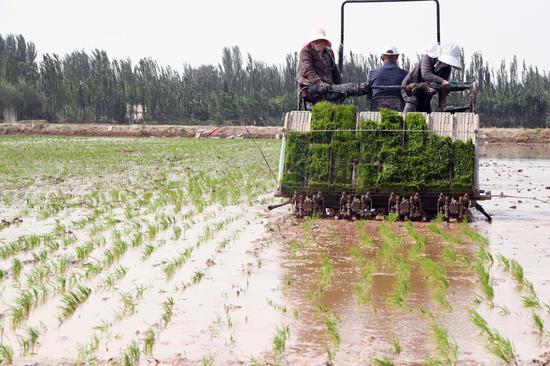



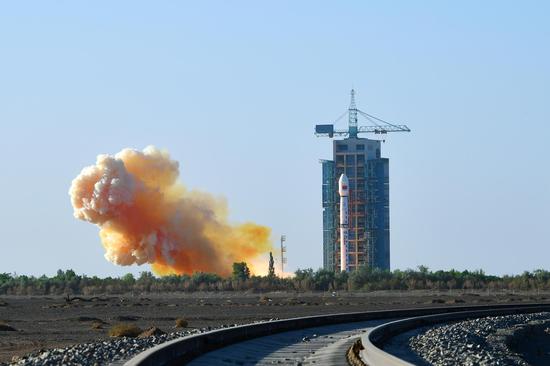



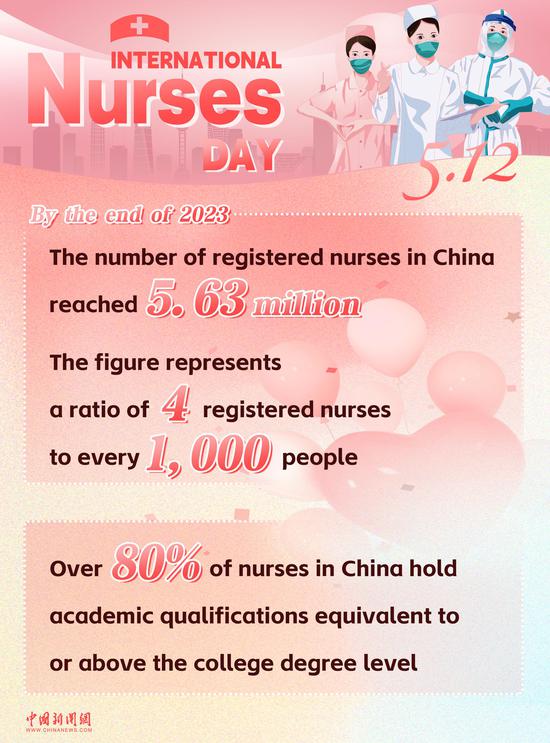





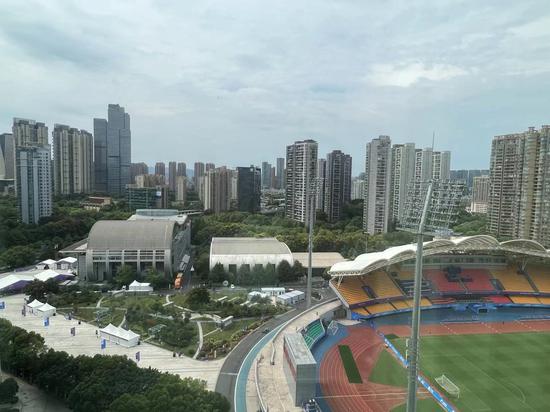




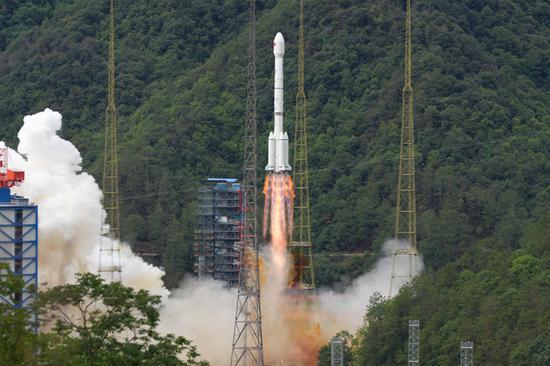

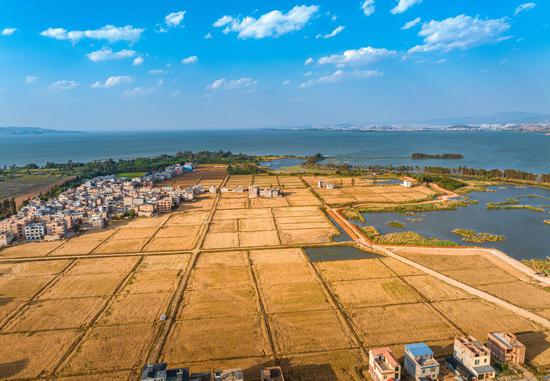
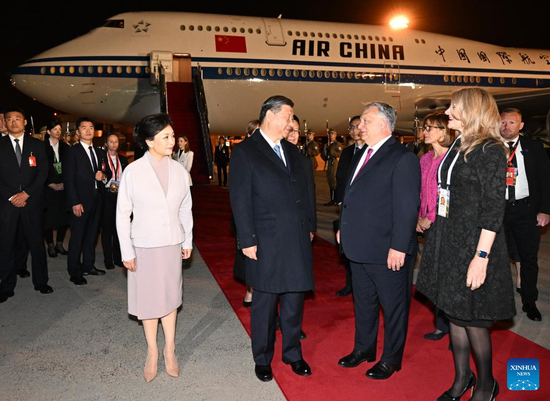

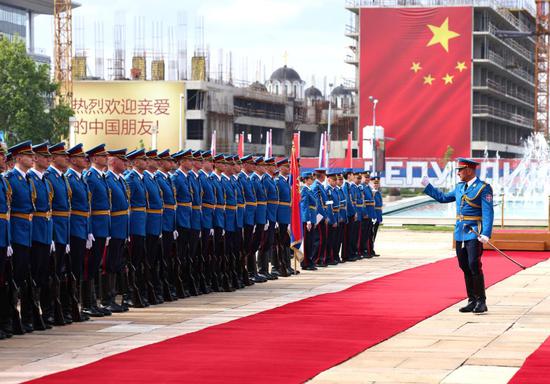


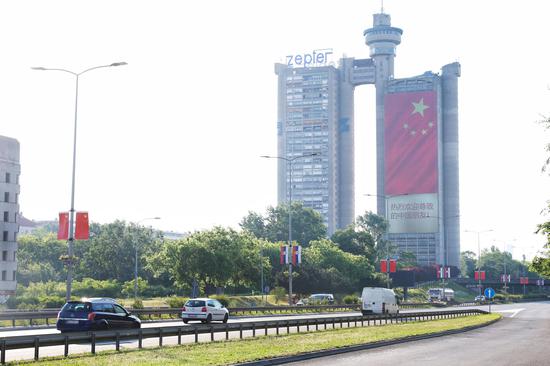


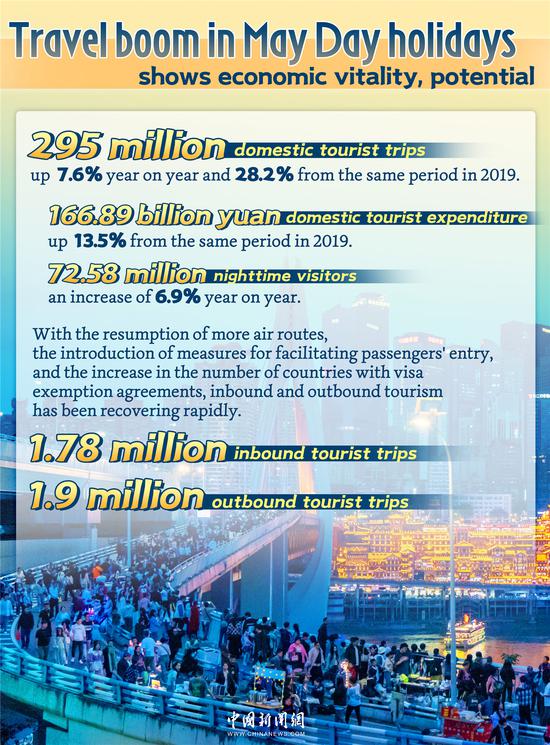
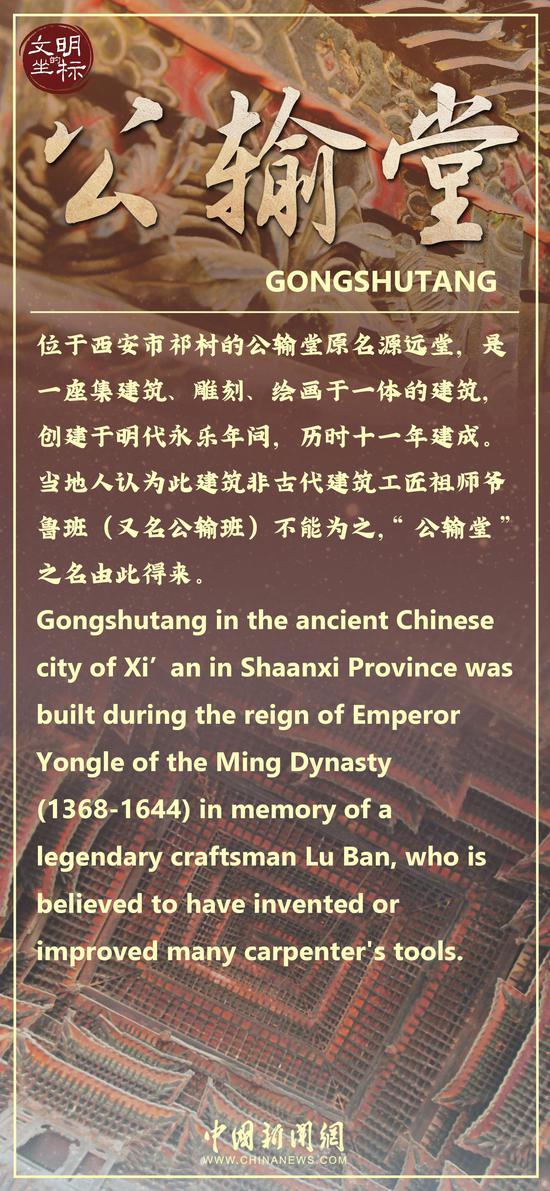





 京公网安备 11010202009201号
京公网安备 11010202009201号